- Home
- Claire North
Notes from the Burning Age Page 2
Notes from the Burning Age Read online
Page 2
“If you scratch your knees, Mama will be so angry,” warned Yue from below, not looking up from her reading.
Vae stuck her tongue out; familiar with the habit, Yue returned the expression, still not lifting her gaze, above and below all such things.
“Yue’s boring,” Vae hissed. She was disappointed to realise that even in her most dramatic voice her elder sister either hadn’t heard her or didn’t care. With a haughty twist of her chin skywards, she turned away from the argument that she had most clearly won and resumed climbing. I paused a moment below her as a red-bellied beetle head-butted my curled hand, considered this obstruction to its journey, then climbed onto my skin and resumed its ambling, king of the world.
If you listen for the legs of a beetle over a child’s skin, you will not hear it. But listen – now listen. And as well as hearing nothing from my crimson friend, I heard a greater nothing too. The crows had fallen silent. So had the songbirds and white-bellied thrushes, the leg-scratching insects and the little cooing creatures of the underbrush. Only the sound of Vae calling, “Ven! Higher!” broke through the hissing of the leaves.
The beetle reached the other end of my hand and wobbled for a moment on the edge, surprised, it seemed, by a steepness which on the way up had caused it no difficulty.
Now listen.
Listen.
Close your eyes and listen.
Leaf on leaf is the brush of something leathery, dry, living and dying. Below, Yue reads, one finger tapping against her elbow as she cradles the inkstone in her arms, eyes tracking across the words on its screen.
Listen.
And here it is. The crackling snap-snap-snap through the forest. Gases, popping apart, breaking something solid into pieces. A groaning of fibres under pressure and then giving way in a single tear, gushing out smoke and steam. The slow grinding creak of the oldest, weakest trunks finally giving way, the smack as they slash into a neighbour while they fall, the sudden updraught of ash and spark into the sky as the impact throws more flames out, caught in the wind.
The beetle, which had been searching for a way down and found none, reared up, opened a pair of bloody wings and buzzed away, bouncing under its own ungainly airborne weight.
And here it is, the tickle at the end of your nose, the taste of it on the tip of your tongue, the taste of black, a stinging in your eyes, and I realised what it was just as Vae shrilled: “Fire!”
The great forest was burning.
Vae was already halfway down the tree before I started moving, not a child any more but a creature entirely of the wood, of speed and limb slithering from foot to hand to foot. I tried to peer through the leaves, to see how close or how far it was, but Yue was on her feet shouting, gesturing furiously at us to get down, and how quickly the world changed! The sunlight, which had been pools of gold and silver pushing through the trees, was now a million broken shafts in the air, given form and dimensionality by the smoke drifting in with the wind. The noise of flame, which began in bits and pieces, was already an all-consuming roar, a sucking in of wind and an exhalation of fire that left no room to pick out the details of trees falling and earth turning to soot.
I reached the ground a few moments after Vae and immediately regretted it, the smoke now tumbling in thick and black, biting my eyes and prickling my throat. Yue pulled her shirt up across her face, and we copied her, scrambling, blinking, tears running down our cheeks, towards the path. Now I could look back, and see the orange glow beginning to drown out the day, and look below, and see it there too, pushing along the banks of the stream beneath the waterfall, moving so fast, like deer before the wolf.
“Stay close to me,” Yue commanded, and for almost the first time since Vae was old enough to say “sister”, she nodded and obeyed.
The path down, so easy to climb, familiar to us, was now slow, agonising anguish, every step unsteady, every breath a minute’s tick on a spinning clock. Vae slipped and got back up without complaint; Yue grunted as her footing gave way and she caught herself on a root, her face curled in a snarl as if to dare the forest to betray her one more time, and she kept on going. I tumbled after them, on my bum as often as my feet, nettles prickling my fingers and stabbing through my shorts, until we reached the path above the river. Here the smoke was a broiling fog, and I blinked and could barely keep my eyes open, put my hands over my face to try and block it out, peered through splayed fingers and could hardly see a foot ahead of me. The noise of the fire was deafening, and I could feel its heat at my back, moving so fast, a warmth that began as the pleasant glow of the stove on an autumn day and now rose and blistered into a relentless, inescapable grapple that squeezed the life from my skin and the breath from my lungs. I called out for Vae, and thought I heard her answer; called out for Yue and couldn’t see her, began to panic, then felt a hand catch mine and pull me along.
I don’t know when we got turned around, when we lost our footing. I heard the compression batteries explode on the ridge overhead, a thunder as the overheated gas inside finally ruptured the buried tanks to shower what little of the forest wasn’t blazing with mud and torn fibre and metal.
We briefly outran the flames into a little gully, a bowl of untouched elder thorns and purple flowers into which the smoke hadn’t seeped. Then we crouched low, our faces crimson smeared with ash, and knew that we were lost. Vae started to cry, silently, and I knew I was mere moments behind, when Yue shook her head and hissed, “Down!”
I thought she meant down deeper into this gully, perhaps burying ourselves in soil and hoping the fire would pass by, but she rose to her feet and instead followed the land down, no path, no easy route, just swinging from tree to tree like a drunken squirrel, propelled by her own headlong momentum towards the bottom of the valley. If we had done this dance by daylight, it would have been ridiculously dangerous; by the light of the fire it felt entirely natural, and we flung ourselves after her, tripping on our own feet and tumbling for the darkness below.
I didn’t hear the river over the fire, which now domed above us. Looking up for the first time, I could see actual flames withering the edges of the leaves on the trees in orange worms, spitting and spilling up the branches in fluorescent crimson. Then my feet hit water and sank almost immediately into the grit below. I caught myself for a second, lost my balance, fell onto my hands and knees and crawled after Yue, who was already knee-deep and wading deeper. I followed, catching at rocks and feet slipping, banging on stone as I slithered into the stream. The current caught sudden and hard a little before halfway, flowing freely round grey mottled boulders that had obscured its path. It pushed me to the side, and I pushed back, submerged my face briefly to wash away the burning around my eyes, looked up and for a second through the smoke saw Yue, now up to her waist, reaching out for Vae to my left and behind me. I was half-walking, half-swimming, arms flapping against the current as my feet buckled and slipped on stone, coughing black spit with every breath, ducking my head below as long as I dared only to surface and cough some more in the toxic blackness that raged through the valley. All around was ablaze, too bright to look at, my hair starting to curl from the heat of it pressing down against the river. When I was shoulder-deep, I turned my whole body against the current like a kite against the wind, straining as it tried to snatch me away. I reached for Yue, hoping to steady myself on her, and for an instant our fingers caught before the weight of water pushed us apart. Then she looked past me and her eyes went wide.
And there, on the edge of the water, was the kakuy of the forest.
I had seen in temple many different depictions of the kakuy who guarded this valley. In some he was a great wolf; in others a woman shrouded in a cloak of leaves. In some she was a great crow, the same size as the tree he perched on. In others they were little more than an oval stone, with one eye open as if to say, “Who disturbs my rest?” The Medj, when questioned about the true form of the kakuy, always shrugged and said: “How do you describe the colour green, or the taste of water?” The Medj have
always had a good line in saying very little the nicest way.
The day the forest burned, he was eight feet tall, with a white belly of warm, wet fur and a back of crimson feathers that billowed and moulted from him as he bent towards the river’s edge. His eyes were the yellow of the eagle, his snout was a ginger fox, his teeth were sharp, the claws on his hands and feet were black and curled. He rose up on two legs like a bucking horse, then fell down onto all fours and raised his huge head above a flabby neck as if he would howl at the flames; perhaps he did, but I could not hear him.
At his movement, the whole forest seemed to shudder and shake, and for the briefest moment the flames spun backwards as if the wind would change. The kakuy raised his head and howled again, and I felt the river turn icy cold where it held me and a roar of water surge momentarily higher than my head, pushing me under in breathless thunder before I gasped and thrust upwards and surfaced again.
The kakuy looked at us and seemed to see us for the very first time, and though I know very little of gods and the great spirits of the earth that holds us, I thought I saw in his eyes a sadness deeper than any I had ever known.
Then he too caught ablaze. First a feather, then a tuft of fur. He didn’t move, didn’t lurch into the water, but his mouth opened and closed as if he were screaming. His eyes rolled huge in his skull, and he spat and foamed and rippled from his hind legs to the tip of his nose as if about to vomit up black smoke from the internal fire of his roasting organs. Like the crisp edge of an autumn leaf, he curled in on himself as the fire boiled from his toes to his top, front legs buckling first, then rear, snout hitting the ground last as he flopped down to his belly, then rolled to his side, black tongue out and lolling, lungs heaving and panting with burning breath until, at last, his eyes settled again on us. They stayed wide as the kakuy died.
Temple histories are judiciously vague as to which came first. Were the kakuy earth’s punishment for man’s disobedience? Did they wake when the sky rained acid and the forests were blasted pits, to punish humanity for its arrogance, to wipe away the men who had sullied this world? Or did the kakuy wake as the world burned by man’s own design, to heal and salve what little remained, rolling back the desert and the salty sea? Ambiguity is often an ally to theology, as Old Lah would say.
I saw the kakuy fall, and when his blackened face hit the ground the whole forest groaned. Even through the fire and the burning, I heard it; the deep-timbered roaring of the trees bending against their roots, the cracking of stone and the rattling of the white-scarred branches, an earthquake that made the fire itself twist and recoil as if in shame at what it had done. Or perhaps I didn’t. Perhaps in the delirium of heat and smoke and fear, I imagined it all.
I saw the kakuy fall, and when the last breath left his lungs, the wind whipped across the water as if blasted from the hurricane, and the river lurched and buckled as though the spirits of the deep were wailing for the death of their beloved kin, and I screamed and held Yue’s hand tight, and she held mine and we slipped and slid together backwards against the turning of the current.
I saw the kakuy fall, and in that moment my flailing left hand caught another’s. Vae’s fingers brushed the palm of my hand, scrambling like the dancing feet of the spider for purchase. I snatched after her, caught her wrist, don’t let go, don’t let go, but the river was stronger than a child’s grasp. Her fingers slipped a little further down my hand.
Her fingers have always been slipping down my hand.
Caught, in a final hook, joint-to-joint.
Don’t let go, I begged, or maybe she did, it was hard to tell.
Then the river snatched her away.
I saw her go under, feet tipping up as her head fell back. I did not see her hands claw at the burning air. I did not hear her scream. I did not see her rise again to breathe, as the great forest burned.
Chapter 2
This is the history of the Burning Age, as taught by Temple scripture.
There came a time when humankind had dominion over all the earth. With their might, they tore down the mountains and built cities there. With their wisdom, they conquered the seas and skies. Great medicine there was in abundance, and even their gods called humanity special, the chosen creature raised up above all things. For their children, they laboured, to make a better world, and that world would be of man’s making.
Yet their children did not give thanks for the labours of their elders, and lo: the skies turned yellow, the air too dark to breathe from the workings of their industry. The cracked earth bled poisons. The sea rose and salted the land, and no wall of man could restrain it. In winter, the ice melted; in summer, the world burned.
“What shall we do?” asked the wisest of the burning ones, but: “Mankind is stronger than mother earth and father sky,” was the answer, “and we do not flinch before the fire.”
And so the forests were felled and the rain burned the flesh of babes and the rivers ran with lead, and still mankind did not turn from its course, not even when the deserts consumed the fertile plains and the children themselves cried out for change.
“We are stronger than the storm,” railed the greatest of the burning ones. “Weakness is the child’s error.”
It was about the time of the great migrations, when all the nations began to splinter like the burning bough and the wars of water and grain came upon the lands, that the kakuy woke. First they rose from the skeletons of the ocean reefs, glistening bone and acid breath. Then they climbed from the shattered mines, and their eyes were embers of coal and their feet broke the towns beneath their feet. Then they came from the sky itself, upon thunder and lightning they blazed, tearing down the monuments of man and bidding the earth swallow whole the sacrileges of the Burning Age.
The arrogant tried to fight back, as if their weapons were not forged of the same earth which now they sought to harm. They perished beneath the kakuy as the mouse in the eagle’s claws. Those who survived fled to the last of the forests and the sacred hidden places, their thousand tongues blending into new language, their ancient ways changing as does the scudding sky.
From their prayers, Temple was born. The scattered people raised their hands to the falling rain and said: “No more will we confront sky and earth as enemy; henceforth, we shall give thanks to she that carries us. The sun will rise and the sun will set, and we will walk within this changing life as creatures of this world, born within her womb.”
And at last, hearing their prayers, the kakuy turned their wrathful eyes from the remnants of humanity and left the tribes in peace. Where the great spirits walked, the land grew anew; where they laid their heads, fresh springs rose from the barren mountain. And as the forests grew, so in time the peoples of the world grew again, venturing forth as once their ancestors had, to carve a new world from the ashes of the old. We spread across the land and gave thanks for the harvest and the kakuy, who, their work complete, returned to the hidden places of this world to rest once more between sky and earth.
Let not your hands fell the tree but that another is planted.
Let not your ears hear the rain and think it falls for you.
Let not your tongue speak of conquering the mountain, for it will not shiver when winter comes.
And if your eyes should see the kakuy slumbering in their sacred caves, gentle in rest, remember to bow in prayer, for should they wake again, no tears shall douse the flames.
This is the teaching of the Temple on the history of the Burning Age. In deference to the scholars and priests who penned it, most of its lies stem from ignorance and omission, and the rest are at least well-intentioned, all things considered.
Chapter 3
After a great fire, rain.
Water evaporates, the heat pushing it higher and higher until suddenly it is too high, condensing around particles of soot and ash billowed into the heavens by the blaze.
When it falls, a lake tumbles down on you; there are no gentle drops, no merry dancing puddles. You are caught in a nightmare again,
blinded by liquid where a moment before you were blinded by smoke. It is enough to turn the crimson world grey in moments, to bring hypothermia after heat exhaustion, until even your burns are shivering. Here too there is a cycle in all things – water from fire.
As the forest turned to white flaking ash that fluttered like butterfly wings, Yue did not believe that Vae was dead. We clung onto each other and slippery stones, hauling ourselves belly-first onto a little island of lichen and ash, choking on smoke and spluttering in the rain, and could see neither the carcass of the kakuy nor Vae.
We lay there all night, she and I, while the river buckled and roared around us. We didn’t speak, didn’t dare wriggle from our nested nook together. The forest was a glaring, bitter thing, threads of shimmering orange still peeking through the downpour like scars on the back of a writhing snake. I thought it was angry, thought perhaps the kakuy who’d died was some minor spirit of a lesser tree, and any second now we would look up and in the sky would be two eyes of lightning, talons of flame. The creaking of the burnt-out husks of the doused trees falling went on all night, a deafening eulogy sometimes so near we flinched together, buried our heads in each other so we wouldn’t have to see the branches crashing down around us. At other times, it was a faraway chorus, the funeral song of the wood.
In the morning, the first rescue team found us, calling our names, scrambling through the river – take our hands, take our hands. The men and women wore orange, coated in grey, waded through slurry and sludge knee-deep, a soup of rain, river and ash.
“Ambulance!” hollered someone. “Fetch the ambulance!”
The ambulance came as close as it could, where the river met the village. Tinics had survived the blaze with little more than a few sooty scars; fire was a part of forest life, and every hearth was set back a little from the trees, shelters built into the hill itself. But the power was out, the windfarm locked down and blackened, the compression batteries popped from the inside out, and the whole valley lay beneath a snowfall of ash, a hollow of soot and carbon.

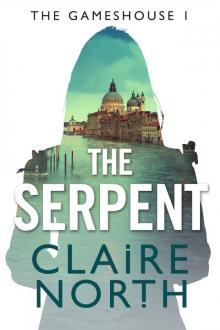 Gamehouse 01 - The Serpent
Gamehouse 01 - The Serpent The Master
The Master Gamehouse 03 - The Master
Gamehouse 03 - The Master The Thief
The Thief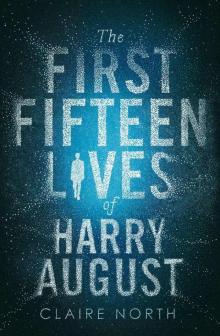 The First Fifteen Lives of Harry August
The First Fifteen Lives of Harry August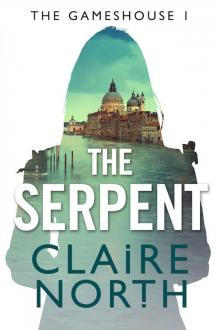 The Serpent
The Serpent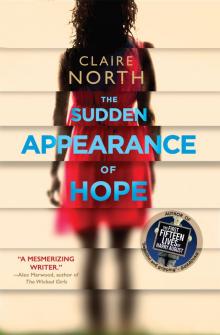 The Sudden Appearance of Hope
The Sudden Appearance of Hope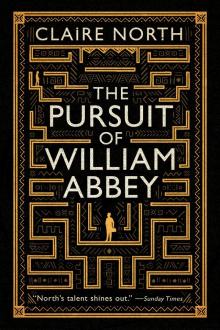 The Pursuit of William Abbey
The Pursuit of William Abbey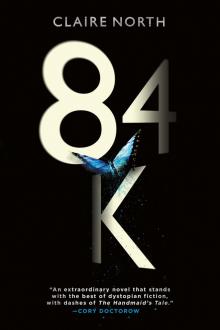 84k
84k The Gameshouse
The Gameshouse Touch
Touch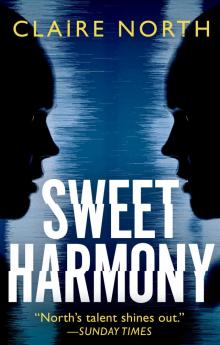 Sweet Harmony
Sweet Harmony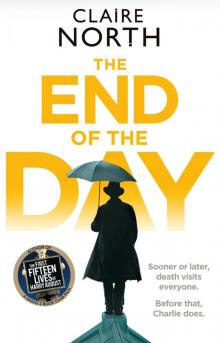 The End of the Day
The End of the Day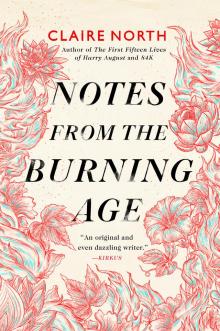 Notes from the Burning Age
Notes from the Burning Age